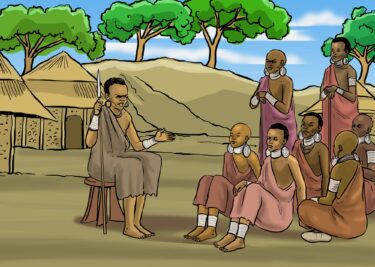Sultan Yusuf: The Lion of Mombasa


The Trojan War is one of the most famous wars in world history. It spanned a whole decade and was fought between the Greeks and the Trojans. The fighting finally came to an end, but it wasn’t strength that won the war; it was intelligence. As history tells, the Greeks pretended to give up the fight and return home, when they couldn’t breach the City of Troy’s walls. They left behind a large, wooden horse as a “parting gift” for the Trojans. As the Trojans watched the Greek ships sail away from their city, they threw down their weapons and began celebrating. Little did they know that the wooden horse they had brought into their city walls, was filled with armed Greek soldiers. Soon enough, the Greek soldiers attacked, and the City of Troy was lost. Ever since, the phrase “Trojan Horse” has been used to describe something that, at first, seems harmless but turns out to be malicious.
From the shores of our coast comes a similar tale of our very own Trojan Horse. His name was Muhammad Yusuf. He was born in Mombasa City in 1608, the son of al-Hasan bin Ahmad – King of Malindi and Sultan of Mombasa. From a young age, Yusuf was thrust in the middle of East African Coastal politics. His father was murdered by political rivals, and in 1615, when Yusuf was just seven years old, he was sent overseas by the Portuguese to a Catholic school in Goa, India. The aim of Yusuf’s Portuguese re-education was to turn him into a pawn who would support Portugal’s occupation of East Africa. Indeed, he converted from Islam to Christianity and was baptised Dom Jeronimo Chingulia. When he eventually returned to Mombasa after 15 years, the Portuguese were confident that in him they had an ally. They would later learn that they were wrong.
Despite being away, Yusuf never forgot his home. The Portuguese assumed that their brutality went unnoticed to Yusuf, but he knew all about how they had been oppressing his people. They trusted him so much that they even appointed him Sultan upon his return. Little did they know that their supposed ally hated them. Yusuf kept up his pretence and bided his time until he could wage a war and liberate his people. All the while, he was strategically forming alliances through marriages to women in Mombasa’s most prominent families. He was almost exposed when a Portuguese spy discovered him saying Islam prayers at his father’s grave. Yusuf decided it was time to fight. On 16th August 1631, he led a rebellion. The Portuguese had been prepared for an attack from outside of their walls, but they were taken by surprise when Yusuf and his warriors seized control of Fort Jesus from the inside. They won the war and banished the Portuguese from Mombasa.
Sultan Yusuf is remembered as the Lion of Mombasa and the cunning man who liberated the city from the Portuguese.
#ShujaaStories



